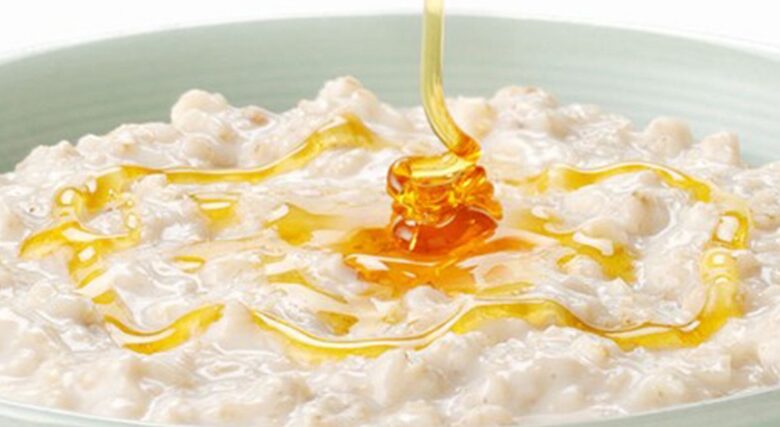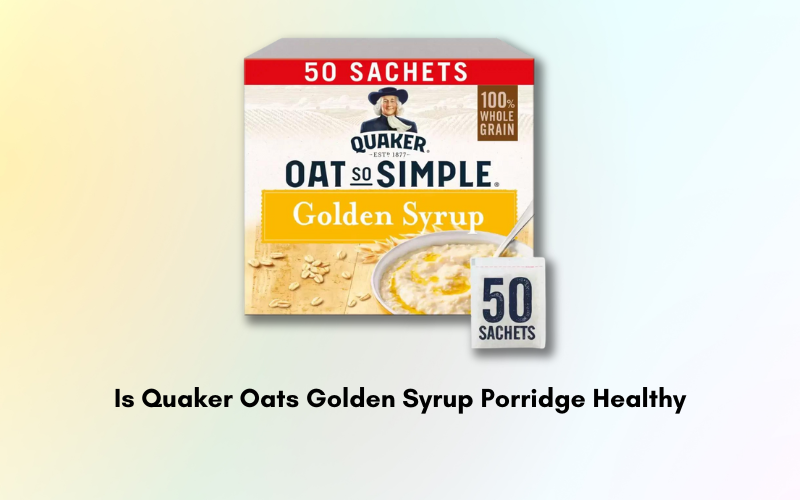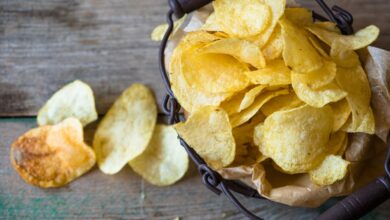Is Golden Syrup Porridge Healthy? Nutrition Facts and Benefits Explained

is golden syrup porridge healthy is a breakfast many people in the UK and beyond grew up enjoying. For some, it’s a nostalgic meal that brings back childhood mornings of steaming oats topped with a drizzle of sweet syrup. Others still consider it a quick, convenient, and comforting way to start the day. Porridge itself has long been praised as one of the healthiest breakfasts you can eat, thanks to its high fiber content, slow-release carbohydrates, and essential vitamins and minerals. However, once golden syrup is added, the picture becomes more complicated.
In recent years, more people have started paying close attention to sugar intake and its impact on health. Government health organizations recommend reducing added sugars to lower risks of obesity, diabetes, and heart disease. Because golden syrup is essentially a concentrated form of sugar, it’s important to look at how it affects the overall nutritional profile of porridge. The question is simple but important: is golden syrup porridge healthy, or should it be considered more of an occasional treat than a daily breakfast staple?
In this article, we’ll break down the nutritional facts, highlight the pros and cons, and explore healthier alternatives. Whether you’re looking for a better way to sweeten your porridge or just want to understand how golden syrup fits into a balanced diet, this guide will give you everything you need to know.
Understanding Golden Syrup and Porridge
Golden syrup is a sweet, amber-colored syrup made from refined sugar. It has a thick, sticky texture and a mild caramel-like flavor that makes it popular for baking, drizzling over desserts, and, of course, sweetening porridge. First produced in the 19th century, it has become a staple in many kitchens. Nutritionally, however, golden syrup is not particularly impressive. It is primarily composed of sugar and provides a high number of calories with very little in the way of vitamins, minerals, or protein.
Porridge, on the other hand, is one of the healthiest base foods you can choose for breakfast. Made from oats, it’s naturally high in soluble fiber, particularly beta-glucan, which has been proven to reduce cholesterol levels and support heart health. Oats also contain slow-digesting carbohydrates that help regulate blood sugar and provide long-lasting energy. Alongside this, porridge offers plant-based protein, B vitamins, and important minerals like magnesium and iron.
When you combine porridge with golden syrup, you essentially take a nutrient-rich food and add a layer of empty calories. While the oats still provide plenty of benefits, the golden syrup increases the sugar content significantly. This transforms the meal from being a wholesome, slow-energy breakfast into something that may cause quick spikes in blood sugar followed by mid-morning energy crashes.
Nutritional Breakdown of Golden Syrup Porridge
A plain bowl of porridge made with water or milk typically contains around 150–200 calories, depending on the portion size and preparation. It’s low in fat, rich in fiber, and provides a good balance of carbohydrates and protein. However, once you add golden syrup, the calorie count quickly rises. A single tablespoon of golden syrup adds about 60 calories and 15 grams of sugar. Many people drizzle far more than that, meaning a simple breakfast could easily contain over 20 grams of added sugar.
Sugar is one of the biggest concerns when analyzing is golden syrup porridge healthy. The World Health Organization recommends that added sugars should make up less than 5–10% of your total daily calories. For an adult, this is roughly 25–50 grams of sugar per day. Just one generous serving of is golden syrup porridge healthy can take up half—or more—of that allowance. This makes it difficult to maintain a balanced diet if eaten regularly.
In terms of macronutrients, golden syrup contributes only carbohydrates, specifically simple sugars. It does not add any protein, fiber, or healthy fats, which are essential for making a meal filling and balanced. Unlike fruits or natural sweeteners that may provide vitamins or antioxidants, golden syrup offers no additional nutritional value. This makes the health equation straightforward: while the oats are beneficial, the syrup dilutes the meal’s overall healthiness.
Health Impacts: Is Golden Syrup Porridge Healthy?

The answer depends on perspective. On the positive side, is golden syrup porridge healthy can provide a quick boost of energy. This may be useful for athletes or people needing an instant pick-me-up in the morning. The oats still deliver valuable fiber and slow-release carbohydrates, so you aren’t completely negating the benefits. Additionally, enjoying a nostalgic, comforting food occasionally can support mental well-being and make healthy eating feel more sustainable.
However, the downsides are significant. The high sugar content of golden syrup can lead to rapid spikes in blood sugar, followed by energy crashes that leave you feeling hungry and tired. Over time, consuming high amounts of added sugars contributes to weight gain, insulin resistance, and an increased risk of type 2 diabetes and heart disease. For people already monitoring their sugar intake—such as diabetics or those aiming for weight loss—is golden syrup porridge healthy is far from ideal.
Nutritionists generally advise that golden syrup should be treated as an indulgence rather than a daily addition. While oats form a strong foundation for a balanced breakfast, topping them with sugar undermines many of the health benefits. In short: is golden syrup porridge healthy is not inherently “bad,” but it is not a healthy choice if eaten frequently. Moderation is key.
Healthier Alternatives to Golden Syrup Porridge
If you enjoy sweetness in your porridge but want to avoid the health pitfalls of golden syrup, there are plenty of alternatives. Natural sweeteners like honey, maple syrup, and agave nectar provide flavor while also delivering trace nutrients and antioxidants. However, it’s important to remember that these are still forms of sugar and should be used sparingly. Low-calorie sweeteners such as stevia or monk fruit extract are also popular, particularly for people reducing sugar intake.
Fruit is one of the best alternatives for sweetening porridge naturally. Fresh fruits like bananas, apples, and berries not only provide natural sugars but also add fiber, vitamins, and minerals. Dried fruits such as raisins, dates, or apricots can also work well, though they are more concentrated in sugar, so portion control is recommended.
For those wanting extra nutrition, toppings like nuts, seeds, and nut butters can make porridge more satisfying and balanced. They contribute protein, healthy fats, and a crunch that complements the creaminess of oats. Adding spices such as cinnamon or nutmeg is another simple trick. These add flavor without sugar and even come with their own health benefits, such as blood sugar regulation and anti-inflammatory properties.
By experimenting with combinations of these toppings, you can create porridge bowls that are not only healthier but also far more exciting than one topped with plain golden syrup.
Tips for Making Porridge a Healthy Breakfast
To make porridge a consistently healthy breakfast, moderation and balance are key. First, limit or avoid refined sweeteners like golden syrup. If you use them, keep the portion small and occasional rather than daily. Second, prioritize whole, nutrient-dense toppings such as fresh fruits, nuts, and seeds. These not only add sweetness and texture but also increase the overall nutritional value of your meal.
Balancing macronutrients is another important factor. Oats provide carbohydrates, but adding a source of protein, such as Greek yogurt, milk, or nut butter, will keep you fuller for longer. Healthy fats from nuts, seeds, or avocado can also help create a more satisfying breakfast. By ensuring your bowl has a good mix of carbs, protein, and fats, you turn porridge into a truly balanced meal.
Finally, be mindful of portion sizes. Even healthy foods can contribute to excess calorie intake if eaten in large amounts. A moderate serving of porridge, paired with nutritious toppings, is more than enough to fuel your morning. With these strategies, porridge can be one of the most versatile, affordable, and healthful breakfasts available.
Conclusion
is golden syrup porridge healthy is a meal that sits somewhere between comfort food and breakfast staple. While porridge on its own is undeniably healthy, the addition of golden syrup adds a significant amount of sugar and empty calories, reducing its overall health benefits. Enjoying it occasionally won’t harm most people, but making it a daily habit may undermine long-term health goals.
The good news is that porridge is a wonderfully adaptable base. With endless healthy topping options—ranging from fruits to nuts and spices—you can create meals that are both delicious and nutritious. The key lies in moderation, balance, and mindful choices. is golden syrup porridge healthy may not be the healthiest option, but with a few tweaks, your morning oats can remain a satisfying and health-promoting breakfast.
FAQs About Golden Syrup Porridge
is golden syrup porridge healthy bad for weight loss?
Yes, the added sugars increase calories and can hinder weight loss if eaten regularly.
How much golden syrup is too much in porridge?
More than one tablespoon significantly increases sugar intake and should be avoided daily.
Can diabetics eat golden syrup porridge?
It’s not recommended, as it can cause blood sugar spikes. Diabetics should opt for sugar-free alternatives.
What is the healthiest way to sweeten porridge?
Fresh fruit, spices like cinnamon, and small amounts of nuts or seeds are the best options.
Is golden syrup better or worse than honey in porridge?
Honey contains trace nutrients, but both are forms of sugar. Neither should be overused.
Can children eat golden syrup porridge regularly?
It should be limited due to the high sugar content. Healthier toppings are better for children.
What are the best toppings to make porridge more nutritious?
Berries, bananas, nuts, seeds, nut butter, and spices like cinnamon are excellent choices.
You May Also Read: Best Places to Ski April




